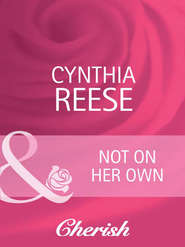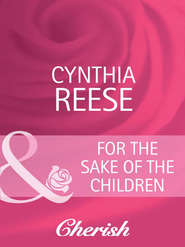По всем вопросам обращайтесь на: info@litportal.ru
(©) 2003-2025.
✖
The Baby Wait
Автор
Год написания книги
2018
Настройки чтения
Размер шрифта
Высота строк
Поля
That was true. The first time I’d met Cherie was when Maggie and I had spied on Joe during football practice our senior year. Cherie, an immature eight, had barreled up the stands where we sat and grabbed my soft drink out of my hands.
“I’m thirsty! I wanna drink!” she’d shrieked as I told her no out of pure reflex.
The resulting altercation had attracted the attention of Joe’s football-coach dad, who’d been glowering on the sidelines. He came up to where we tussled over a fifty-cent soft-drink can.
“Baby girl, you know you don’t want somebody else’s germs,” he’d said, swooping her up and totally missing the part about respect for personal property. “Here’s some money. You go get your own drink. But don’t tell your mama, okay? Just our little secret, got it?”
Then he’d turned, looked out on the field at his son. “Joe!” he’d bellowed in a harsh voice. “You knuckle-head! That’s not how I wanted you to run that play! Give me twenty and then sit your backside on the bench so you can let a real quarterback show you how it’s done.”
The bump of Maggie’s SUV as it hit the access ramp to I-16 brought me back to the present. Maybe Joe feared he’d be the father his dad had been to him—or to Cherie.
But Joe’d proven an excellent father to Matthew. I just had to remind him to have faith in himself—and pray China would soon fling wide the adoption floodgates.
CHAPTER FIVE
MAGGIE AND I blew Saturday. We poked along like two little blue-haired old ladies. I had no inclination to head back to the demilitarized zone I called home, so for once I wasn’t rushing her.
We pulled up in my drive at about six. I saw no sign of Joe, but Rick’s truck was parked in front of the workshop. I figured they’d wandered off somewhere.
After Maggie had headed home to Campbell, I sorted out my groceries from the ones I’d bought for Ma. I dreaded facing her, but she was right: Grocery shopping with no means of transportation was difficult.
Like Maggie, Ma lived in Campbell. It was where I grew up, where I’d gone to school. Ma had raised me in a series of tar-paper shacks and rundown mobile homes, always moving one step ahead of the eviction notice. I remembered too many times when we’d go for a day or so without lights or propane because Ma had drunk up all her paycheck.
I never knew my dad. Ma had gotten pregnant when she was sixteen, followed by a shotgun wedding at the behest of Ma’s own drunk of a father. I suspected Granddaddy was more concerned with ridding himself of responsibility than with his only daughter’s virtue.
The marriage vows dissolved before I was even born, and my dad took off to parts unknown. Ma said he’d gone out to get a fifth of liquor and never came back. She always seemed more ticked about him diddling her out of that last bottle than him abandoning us.
She waitressed at a series of local cafés and beer joints, chronically disenchanted with whatever her current employment situation was. My ma was made to be a rich, idle woman with a richer man to take care of tedious details like paying bills on time. She was not made for hard-scrabble survival.
Our penury, though aggravated by her love of liquor, humiliated her. She’d send me in the grocery store to buy food so I would be the one to present food stamps to pay for it.
It bothered me, too. I still remember the burning shame that coursed over me when a careless lunchroom worker shouted to the new cashier, “Honey, don’t mind her. She’s one of them that gets a free lunch.”
The Boatwrights’ clean, well-run home told me I didn’t have to live in squalor. To this day, the smell of laundry-fresh sheets will take me back to the day Cecilia Boatwright showed me how to fold a fitted sheet. It boggled the mind of a kid whose mother was content to sleep on sheets gray with filth.
Maggie’s mom taught me everything about running a house. She made a big production out of including Maggie in her tutelage, but even as a little kid, I knew what she was doing. I loved her even more fiercely for it.
I pulled into the housing project Ma unwillingly called home these days. She hadn’t liked it, but after I’d sold her car, she didn’t have much choice. She needed to live in town where she could at least walk to the small selection of stores Campbell had to offer, and public housing was about all she could afford on her monthly disability check.
The sight that greeted me in the growing twilight filled me with dismay. Ma was busy having herself a dustup with her neighbors and the police. I groaned and got out of my Volkswagen.
“—don’t want nobody botherin’ my stuff!” she shrieked. “’s my stuff, and don’t want none of youse botherin’ it. I know you took it, you theivin’, no-good—”
Here, her language deteriorated into a string of racial slurs, sure to go over well with the young black patrolman who looked like he’d rather be anywhere but dealing with Nora O’Rourke.
I crossed the threadbare grass, worn down to the South Georgia sand where kids had played tag and baseball. “Ma! Ma! Calm down. What’s wrong?”
But asking Ma to calm down produced as much result as telling a hurricane to go back to the middle of the Atlantic. I turned to the patrolman. I recognized him. Cedric had graduated from Bryce County High School only the year before.
“Hey, Cedric. What’s the deal here?”
“This your mama, Mrs. Tennyson? Gosh, I wouldn’t have thought it. She sure ain’t like you.” Cedric looked momentarily abashed at his unsolicited candor. “Uh, sorry. Didn’t mean anything by it.”
“No, Cedric, you’re right. She’s not like me. But she is my mother. So what have we got here?”
Cedric scratched his head. “Mrs. O’Rourke here seems to think—”
“That’s Miss, thank you very much! I took back my maiden name when that sorry piece o’ white trash took off on me. Sara? Sara, is that you?” She weaved unsteadily in my direction, and I realized she was drunker than I thought.
“Yeah, Ma. It’s me.” Weariness settled over me, down to my toes. It wasn’t the separate incidents that did me in. It was the unending frequency of them, the feeling it would never get any better.
“Uh, Miss O’Rourke seems to think someone has stolen some money from her and some family heirlooms.”
I couldn’t bite back the laughter that pealed from my lips. Cedric looked astonished at my reaction.
“Cedric, trust me. We don’t have any family heirlooms. I think what’s happened is my mother is a little drunk, and she’s forgotten where she put something. If you’ll help me get her back in her apartment, I’ll take it from here.”
The apartment was a pigsty. I’d cleaned it up the week before, but she’d totaled it since. Dishes rose high on every horizontal surface. Clothes lay strung out over the soiled sofa and chairs. The stench of collected garbage and vomit mingled together in the airless room, making me want to heave.
Cedric held on to Ma’s arm as he guided her over a tangled knot of panty hose and a gray-as-plaster bra. He wrinkled his nose at the smell and looked embarrassed at having to wade through a woman’s dirty underclothes. He settled her on her couch atop yet another pile of clothes, backing up carefully. Just as he turned around, he upset a bowl of sour milk and Cheerios on the battered coffee table. Cedric’s lightening quick response saved it from landing on the stained beige carpet.
“Oops, nearly made a mess there,” Cedric said.
I gave a wry chuckle. “Think the mess was already here. What’s a little spilled milk in a disaster zone like this?”
Ma sat quietly, docilely, on the couch, blinking in confusion. The drama that had energized her now gone, she yawned without bothering to cover her mouth. “Y’know, I’m kinda tired. Think I’ll go to sleep.” With that, she keeled over, her head smashing down on the hard arm of the sofa.
“She gonna be okay?” Cedric asked. “Should I—should I get her a pillow or something, Mrs. Tennyson?”
I shook my head. “This your first day or so on the job, Cedric?”
He puffed his chest out with pride. “No, ma’am. I’ve been on the force for a week now.”
“Good for you!” I nodded my approval. “Let me tell you a secret about my mother. She’s a drunk. Always has been. Always will be. You’ll be called out here more times than you can count. She’s like a bad ol’ country song, somebody’s always done her wrong. But if you just steer her back into the apartment, she’ll usually sleep it off and not be much of a bother to anybody. And I wouldn’t worry too much about niceties like pillows. She’s managed to survive this long. I expect she’ll keep right on.”
Understanding began to dawn in Cedric’s eyes. He gave me a long, considering look. “I appreciate the advice, Mrs. Tennyson. I’ll sure keep it in mind.”
“Oh, and Cedric, she’s racist as the day is long, but don’t be offended by that. She hates everybody.”
He nodded slowly, comprehension moving him backward to the open apartment door. “Guess I’ll be going then, if I can’t be of any more service to you, Mrs. Tennyson.”
“Thanks, Cedric. I appreciate you looking out for her.”
My mother interrupted our goodbyes with a loud and lusty snore.
I tackled the bedroom first, stripping off sheets and gathering up clothes and liquor bottles. From all appearances, Ma had come into an unexpected windfall and celebrated with cheap booze. Once I had the bedroom presentable, I walked a sleepy, protesting Ma back into her bathroom and washed her up as well as I could. Then I guided her to the bed, pulled the covers up under her chin and gazed down at her.
Daughters were supposed to love their mothers, and I suppose I did love Ma. She couldn’t manage to stomp out that basic feeling.











